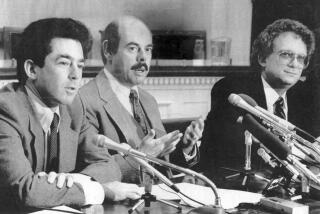A Self-Made Millionaire Who Beat the Odds
- Share via
DETROIT — In a friendly competition with his buddies, Don H. Barden bowls three consecutive strikes.
“I never play to lose,” he says.
How true.
Barden quit college broke and turned his first million 15 years later. Using capital from one venture to quickly finance the next, he built his net worth to more than $100 million and today is one of the wealthiest black businessmen in America.
His current goal is to win a casino license in Detroit, which would help put Barden Cos.--a mix of construction, broadcasting, distribution and casino businesses--at or near the top of the nation’s black-owned industrial and service companies, up from No. 18.
Then, who knows? He has an option on 500 acres in the Virgin Islands for a resort and casino. He has architects poring over plans for malls, hotels and restaurants in Indiana. He dreams of Barden gambling palaces in Las Vegas and Atlantic City.
“I’m on a mission to prove that a poor, young African American from a very large family, from humble beginnings, can rise to the top in America in a free enterprise system,” he says.
Barden says he isn’t looking to be a billionaire, though he admits he wouldn’t mind.
“It’s bragging rights,” Barden says. “It’s prestige. We’ll become role models for young people.”
At 53, he already has the kind of success that allows him to hobnob with Joe DiMaggio at Bryant Gumbel’s golf tournament, keep company with Namibia President Sam Nujoma and teach President Clinton the Hustle following a state dinner with South Africa President Nelson Mandela.
*
Through it all, his friends say, he remains unchanged from the kid who drove a tractor on his parents’ farm.
At his weekly bowling game, Barden is just one of the guys. His name is stitched on the back of his shirt, he smokes Winstons and wears a plastic wrist support. But his pinstriped pants, cellular phone and glistening jewelry hint that he’s a businessman.
“Don, I beat you by one point!” says buddy Dave Wilson, a Conrail regional manager.
“That’s the last time,” Barden responds. “So you better enjoy it.”
Barden works hard to make sure he wins.
Since Michigan voters last fall approved construction of three casinos in Detroit, Barden has spent millions hiring architects, securing potential sites and buying billboards trumpeting that a casino for Barden is “the right thing to do.”
There are Barden T-shirts, hats and bumper stickers. Hundreds have written letters to the City Council and Mayor Dennis Archer supporting Barden.
An Archer spokesman says it won’t help, because the mayor will consider only the strength of each casino plan.
Barden sees it otherwise. “If we’re not selected,” he says, “people are going to want to know why.”
Barden learned about hard work as the ninth of 13 children on the family’s 9 acres in Inkster, Mich. There, the Bardens grew vegetables and raised chickens and pigs to help feed themselves.
“We were poor,” Barden says. “The work ethic I developed, I gained from my parents.”
There were other lessons along the way--like the time he was 18 and rebuilding auto parts.
“I noticed that the owner of the store was up at the front counter with a beautiful white shirt on, making all the money, and I was the guy in the back doing all the hard work,” he says.
“That gave me the motivation to try to be successful with my own business.”
He scraped together money to go to Central State University in Wilberforce, Ohio. When it ran out after a year, he dropped out.
He moved in with a brother in Lorain, Ohio, in 1964 and started the first in a series of odd jobs. He worked as a mover, plumbing and heating company laborer, short-order cook and shipbuilder.
Then, at age 22, he opened Donnie’s Record Shop. He started a weekly newspaper a year later and in 1968 began an advertising and public relations business.
His first big boost came in 1971, when he learned military recruiters were looking for office space. He mortgaged his home and bought a building for $25,000 that he remodeled and rented to the military, clearing $200 a month.
Two years later he sold the building for $50,000.
Next he bought an $85,000 building. Later he built a $1-million building. Then a $3.1- million building.
He joined the Lorain County Chamber of Commerce, was elected to a City Council seat, played golf with community leaders. For a decade, he hosted a weekly TV news programs--and read the TV trade magazines.
*
Cable TV had possibilities, he thought, and he invested $2,000 each in two cable franchises in Lorain and nearby Elyria. When he sold them a few years later, he cleared $400,000.
Next came a $3.4-million cable franchise in Inkster. Later he had franchises in Michigan’s Romulus and Van Buren Township.
By the early 1980s, he had assets totaling about $6 million.
Then he put all but $1 million on the line to win a Detroit cable franchise. The risk paid off. When he finished selling his cable interests in 1994, he had cleared $115 million.
He expanded his holdings, building his work force to 1,500 people. Revenues were $93.2 million in 1996, and he expects to clear $130 million this year.
His wife, Bella Marshall Barden, the former finance director in Detroit Mayor Coleman Young’s administration, runs Barden’s real estate enterprise and its Namibia, Africa, office.
Mrs. Barden says that when at home with their 6-year-old daughter, the couple puts business behind them. But at work, she says, he’s the boss.
“As people will tell you, when it comes to Barden Cos., there’s only one Barden,” she says.
When Indiana legalized casinos in 1992, Barden was winding down his cable interests. He saw yet another new venture and beat out 20 applicants to win one of two riverboat gaming licenses in Gary.
Barden still visits his Gary casino every other week. Sometimes he dines with customers, giving them advice on how to beat the odds.
“I want them to win,” he says. “I want them to be happy. I want them to come back.
“I don’t want them to win too much, though,” he says.
More to Read
Inside the business of entertainment
The Wide Shot brings you news, analysis and insights on everything from streaming wars to production — and what it all means for the future.
You may occasionally receive promotional content from the Los Angeles Times.










